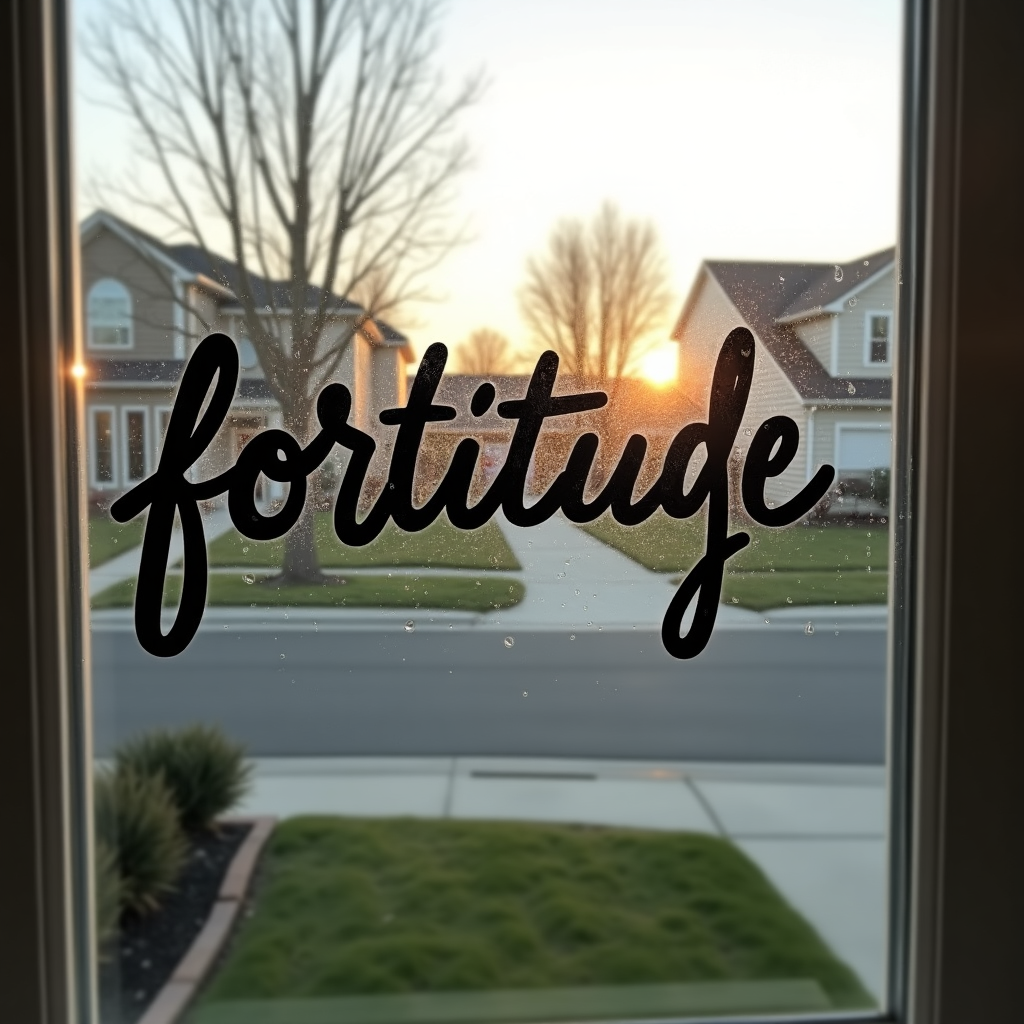Fortitude: Finding Meaning in a World of Interpretations
There’s something powerful about seeing a single word scrawled across a rain-speckled window. This morning, I found myself staring at just that—fortitude written in thick, lowercase cursive black sharpie on my neighbor’s window. Outside, a gentle rain fell while sunlight somehow broke through the clouds, casting everything in that peculiar glow that only happens when the world can’t decide between sunshine and showers.
That juxtaposition—permanence against impermanence, strength against vulnerability—got me thinking about what fortitude really means in our modern lives.
Beyond Mere Endurance
Fortitude isn’t simply about enduring. It isn’t gritted teeth and white knuckles. The classical virtue of fortitude—celebrated by philosophers from Aristotle to Aquinas—encompasses something richer: the courage to face difficulty with a steadiness of mind and spirit.
In its purest form, fortitude is the strength that allows us not just to survive challenges but to assign meaning to them. To look at the objective facts of our lives—the promotions and rejections, the connections and losses, the rain and the sunshine—and decide what story they tell.
Meaning-Making Animal
We humans are unique in our capacity for meaning-making. When a storm destroys a bird’s nest, the bird simply builds another. When rain falls, the flower simply absorbs what it needs. Neither assigns meaning to these events—they simply respond according to their nature.
But we do something different. We experience an event, and then we tell ourselves a story about what it means:
A job loss becomes either “proof of my inadequacy” or “the universe clearing space for something better”
A relationship ending becomes either “evidence I’m unlovable” or “a necessary step in my growth”
A pandemic becomes either “senseless suffering” or “a reset that revealed what truly matters”
The objective event remains unchanged. What differs is the meaning we assign—and this is where fortitude becomes essential.
Fortitude as Meaning-Making Strength
True fortitude gives us the strength to pause in the space between event and interpretation. To recognize that we have a choice in how we frame our experiences. This isn’t toxic positivity or naive optimism. It’s the courage to look unflinchingly at reality while maintaining the sovereignty to determine what that reality means for our lives.
Consider these different responses to the same event:
Event: A creative project receives harsh criticism
Without fortitude: “This confirms I have no talent. I should give up.”
With fortitude: “This is difficult feedback that contains both truth and subjectivity. I can extract the valuable insights while recognizing that the path to mastery includes criticism.”
The event hasn’t changed, but the meaning—and thus the subsequent action—changes dramatically.
Practicing Fortitude in Daily Life
How do we develop this kind of fortitude? Here are some practices I’ve found helpful:
1. Create a Pause
When something challenging happens, create space between the event and your response. Even a moment of conscious breathing can provide the distance needed to choose your interpretation rather than reacting automatically.
2. Question Default Narratives
Notice your immediate interpretations of events. These are often shaped by past experiences, insecurities, or cultural messages rather than clear-eyed assessment. Ask yourself: “Is this the only way to see this situation? What other meanings might be possible?”
3. Seek Multiple Perspectives
Our individual viewpoint is always limited. When facing difficulty, seek input from trusted others who might see dimensions of the situation invisible to you. Not to replace your interpretation, but to enrich it.
4. Connect to Values
Ask yourself: “What interpretation of this event would best serve the values I want to live by?” When we align our meaning-making with our deepest values, we find coherence even in challenging circumstances.
5. Practice Temporal Perspective
Consider how you might view this situation in a week, a month, a year, or a decade. Time often reveals meanings invisible in the immediate moment.
Authenticity of Chosen Meaning
Some might argue that assigning meaning is somehow inauthentic—that real authenticity comes from accepting the “objective truth” of our circumstances. But I would suggest the opposite.
We are meaning-making creatures by nature. The question isn’t whether we’ll assign meaning to events, but whether we’ll do so consciously or unconsciously, intentionally or by default. True authenticity comes from recognizing this meaning-making power and exercising it deliberately, in alignment with our deepest values.
Fortitude in Community
While meaning-making is ultimately an individual responsibility, fortitude thrives in community. When we surround ourselves with others who are also committed to conscious interpretation of life events, we create a culture of fortitude—a shared understanding that difficulty can be transformed through the meanings we assign to it.
This doesn’t mean we avoid honest acknowledgment of pain, grief, or injustice. Rather, it means we face these realities together while maintaining our collective power to determine what they will mean for our future.
Window’s Reminder
That word on my neighbor’s window—fortitude written in casual, imperfect letters—serves as a daily reminder. While rain falls and sun shines simultaneously outside, I’m reminded that life’s contradictions don’t require resolution. They require interpretation. Meaning. Story.
And the strength to choose that meaning consciously—that’s fortitude. Not just to endure what comes, but to decide what it means. To look through the rain-streaked glass of experience and still see clearly enough to write your own truth across it.
In a world where objective events happen constantly but meaning remains our domain, fortitude may be the most essential virtue of all.
xoxo,
Mitchell Royel

